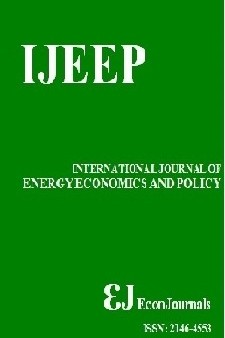Fuel Subsidy Reform and Environmental Quality in Nigeria
Fuel Subsidy Reform and Environmental Quality in Nigeria
- Başlangıç: 2011
- Yayıncı: İlhan ÖZTÜRK
Russia and Europe Under Sanctions: Problems of Energy Development
Coal Sector Returns and Oil Prices: Developed and Emerging Countries
Mohammad Z. Hasan, Ronald A. Ratti
Time Relationships Among Electricity and Fossil Fuel Prices: Industry and Households in Europe
Mara Madaleno, Victor Moutinho, Jorge Mota
Vasanth Vinayagamoorthi, Selvam Murugesan, Lingaraja Kasilingam, Rajesh Ramkumar Ramachandran
Augustine C. Osigwe, Damilola Felix Arawomo
Export Supply of Electricity from Laos to Thailand: An Econometric Analysis
Thongphet Lamphayphan, Toshihisa Toyoda, Chris Czerkawski, Phouphet Kyophilavong
Modeling Energy Consumption, Carbon Emission and Economic Growth: Empirical Analysis for Pakistan
Amjad ALİ, Sabila KHATOON, Muhammad ATHER, Naila AKHTAR
Investigation of Driving Forces of Energy Consumption in European Union 28 Countries
Saleh Mothana Obadi, Matej KORČEK
Katerin Hernández-Gamarra, Julio SARMİENTO-SABOGAL, Edgardo CAYON-FALLON
